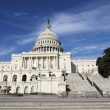Leading local government trade organizations urge for passage of ARPA flexibility legislation
Trade organizations representing state and local governments have joined forces in urging the House and Senate to pass legislation creating more flexibility under the American Rescue Plan Act.
The seven leading organizations representing state, territorial and local governments—the U.S. Conference of Mayors, National Governors Association, National Conference of State Legislatures, Council of State Governments, International City/County Management Association, National Association of Counties and National League of Cities—sent a letter to Senate Majority Leader Chuck Schumer (D-NY), Senate Republican Leader Mitch McConnell (R-KY), Speaker of the House Nancy Pelosi (D-CA), House Republican Leader Kevin McCarthy (R-CA), and all members of the House and Senate urging the inclusion of the Senate-passed “State, Local, Tribal, and Territorial Fiscal Recovery, Infrastructure, and Disaster Relief Flexibility Act” in the next legislative or spending bill.
The legislation, which was approved unanimously in the Senate last October, “would provide additional flexibility under the Coronavirus State and Local Fiscal Recovery Funds that was included in the American Rescue Plan Act and assist with the implementation of this major new program,” the letter reads.
Specifically, local governments could direct their allotments toward “emergency relief from natural disasters or the negative economic impacts of natural disasters, including temporary emergency housing, food assistance, financial assistance for lost wages, or other immediate needs,” according to a statement from the International City/County Management Association.
This is notable given recent headlines of hurricanes impacting both Puerto Rico and Florida.
And a new provision would be created would allow up to $10 million 30 percent of the total ARPA allocation set aside for a state or local government to be used for infrastructure-related activities that are authorized under federal transportation law, or Title I of the Housing and Community Development Act.
Besides this increase in spending flexibility, the bill would additionally give the Treasury flexibility it needs to keep up with various support initiatives it manages alongside the federal spending initiatives.
“Available funding is insufficient to allow Treasury to maintain the current levels of support it provides related to the Coronavirus State and Local Fiscal Recovery Funds (SLFRF), the Coronavirus Capital Projects Fund, the Emergency Rental Assistance Program, the Homeowner Assistance Fund, and the Local Assistance and Tribal Consistency Fund,” according to a statement issued by the International City/County Management Association. “Passing the ARPA Flexibility Act would resolve this problem by giving Treasury the flexibility to repurpose its administrative funds across programs.”
The statement notes that, without this added flexibility, “we are very concerned that Treasury’s diminished capacity to administer these programs will hamper our efforts to spend funds effectively to respond to the needs of our residents across the country.”




















